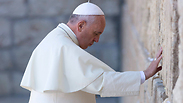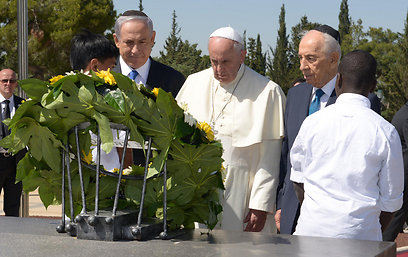
The new Jewish-Christian alliance
Op-ed: In a period in which Jews and Christians have a common enemy in the form of radical Islam, Israeli officials should understand the great potential of the building relationship with the Catholic Church.
For many years, the Catholic Church and Jesuitic elements on US campuses have tried to downplay radical Islam's battle against Christianity, choosing to deal with the murder of Christians unwillingly, out of a desire to provide an example of avoiding violence, neutrality and love of the other and encouraging of the intra-religious dialogue. But all that turned into clichés of moral surrender and political weakness vis-à-vis cruel Islamic groups, and some say that the Church's restraint in fact authorized the ongoing killing.
There have recently been signs that the Christian world in general, and the Catholic Church in particular, are changing direction. The Vatican's representative at the United Nations has called for military intervention against the Islamic State forces in Iraq, and even Pope Francis has implied that there is a need to use military force.
The pope's recent statement about the Armenian holocaust during the Ottoman Empire era is particularly interesting: Sources in the Vatican believe that the Church sees its current failure in treating the anti-Christian violence as a continuation of its past failure to condemn the killing of Armenians as a genocide out of religious motives.

On the other hand, there seems to be a building relationship with the Jewish people and the State of Israel. In 1904, when Theodor Herzl turned to Pope Pius X and asked the Church to recognize Zionism, the pope replied: "The Jews have not recognized our Lord, therefore we cannot recognize the Jewish people."
After the Holocaust, and since the State of Israel's establishment, the Church has undergone a theological-political revolution: In 1964 it recognized the injustices of anti-Semitism. Later on, the acceptance of the Jews led to recognition and normalization with the State of Israel and to popes' visits to Jerusalem. Pope Francis' visit to Herzl's grave in 2014 carried a special historical meaning of Catholic recognition of the Jewish people's right to sovereignty in its land.
Not everyone in Israel understands the depth of the change and its international ramifications. "Our relationship with the Church is very important," says Rome's Chief Rabbi Riccardo Di Segni, "but Israel is dealing with this issue on an elementary school level."
Sources in the Vatican and in the Israeli Foreign Ministry have also been stressing the great potential of the building relationship, pointing to the growing curiosity among Catholic believers about "their Jewish brethren."
But the rabbinical establishment in Israel barely deals with the Christians. Di Segni says the rabbis who are supposed to be handling the relations between the religions "lack historical understanding," while the diplomats "lack theological understanding."
Israel does have an ambassador in the Vatican, but state officials should understand that in many places in the world we are perceived as a sovereign entity with a huge theological importance. In Europe and in the Third World, Pope Francis is an important player in condemning the new anti-Semitism. "Because of our commons roots," he said recently, "a true Christian cannot be anti-Semitic."
In a period in which we and the Christians have a common enemy in the form of radical Islam, we should remember theologian Joseph Dan's important statement: "A society shaping its self-image should also pay attention to the way it is perceived by those looking at it from the outside."










